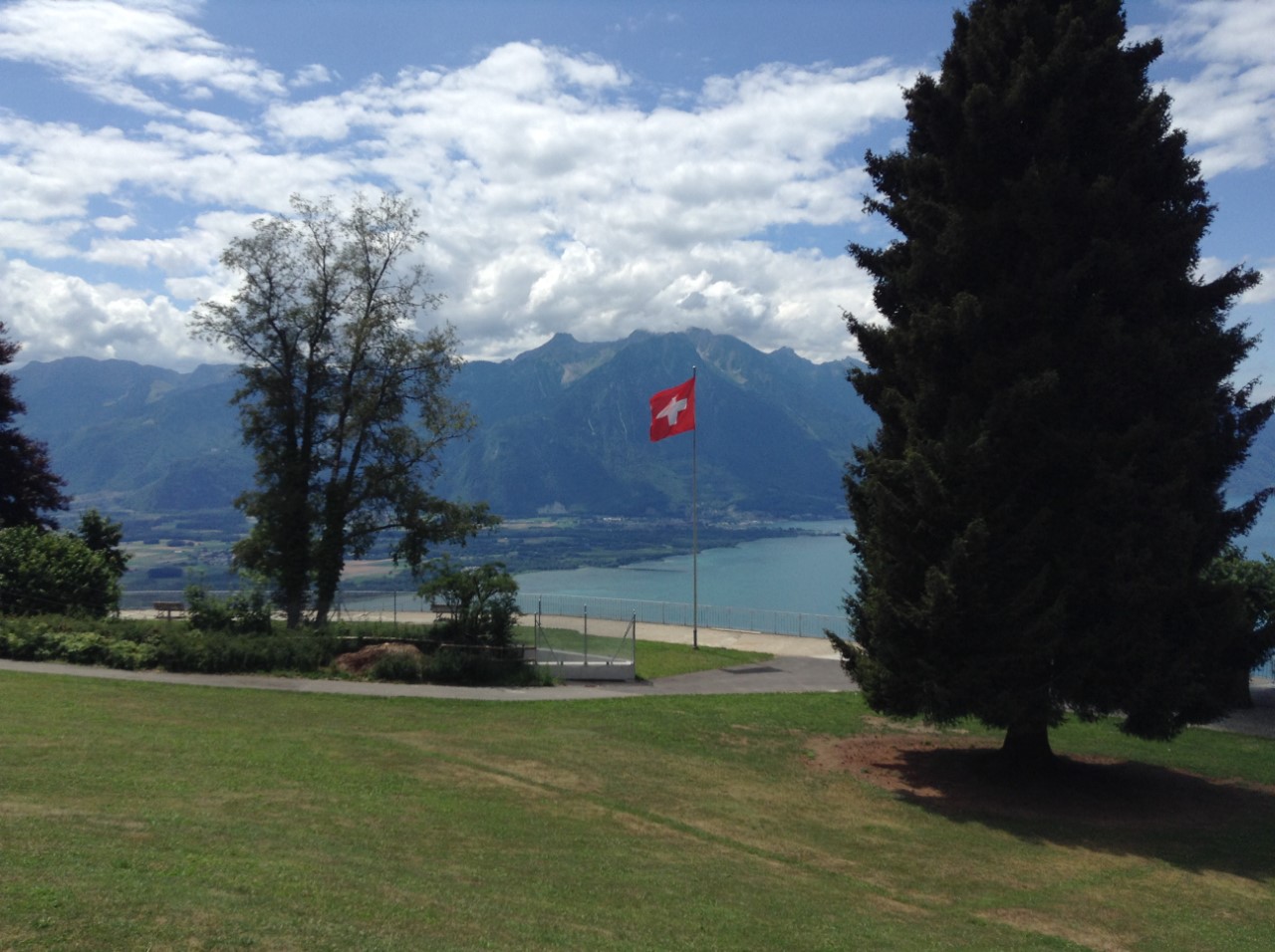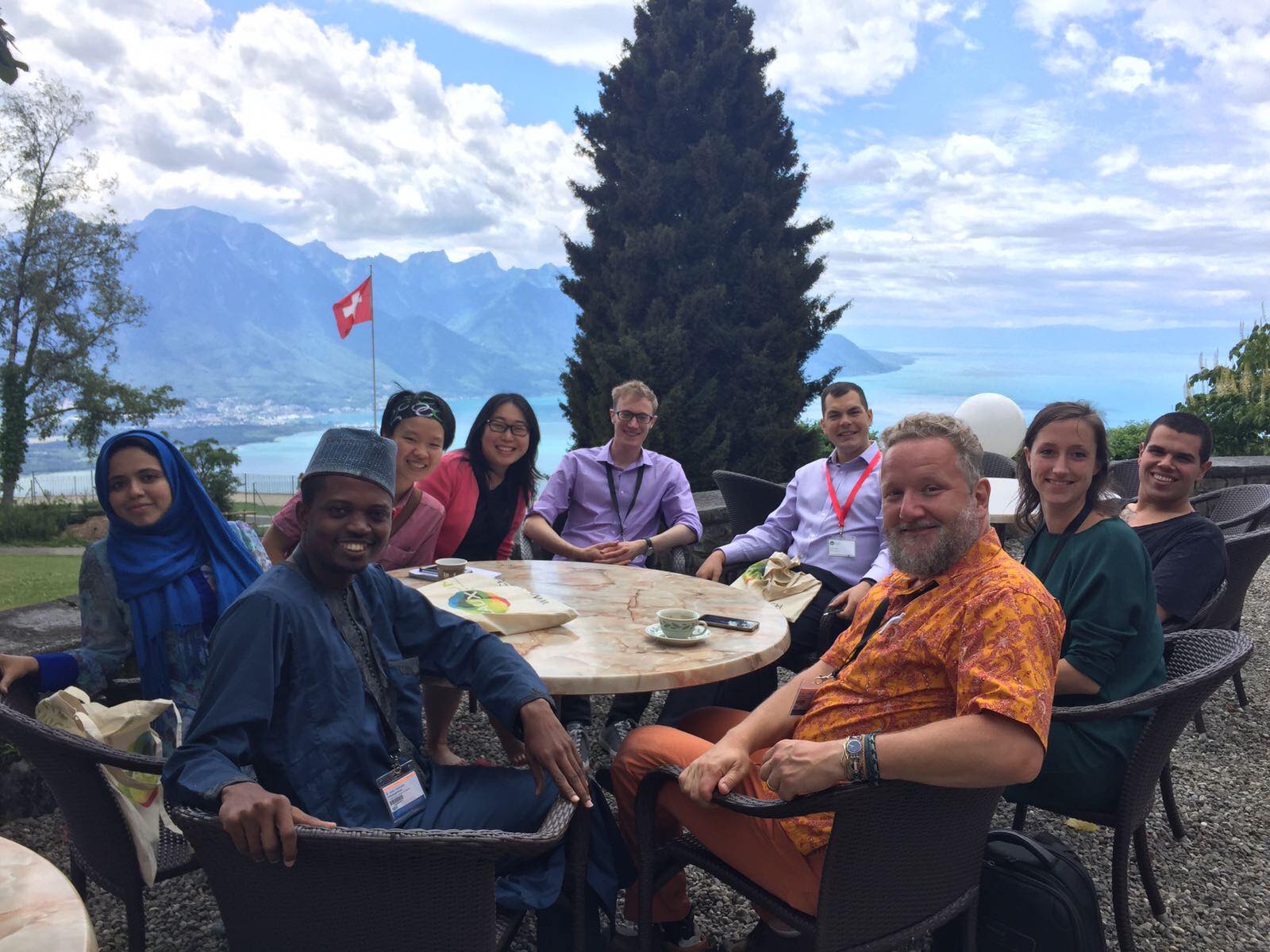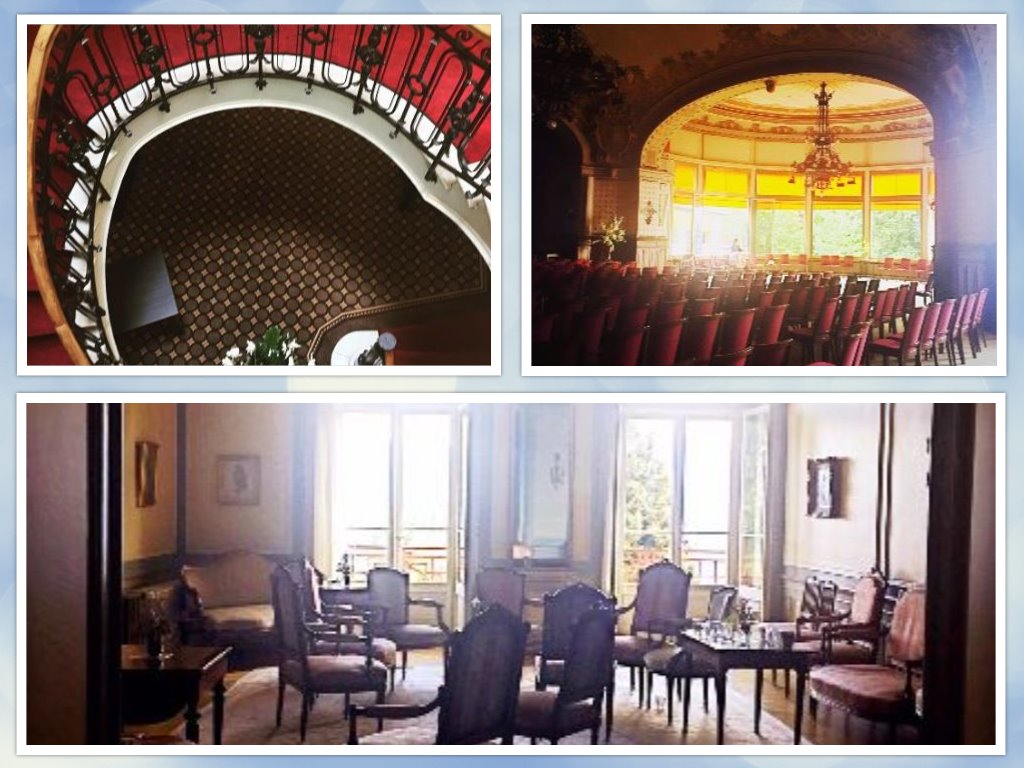Caux Dialogue on Land and Security: ‘A True North-South Dialogue’
Halfway up a Swiss mountainside, Delia Paul discovers a global conference with a difference.
The first clue was the conductor at the Montreux railway station. Nodding to the giggling group of young women boarding the train, he snapped, ‘Caux’? They assented. A middle-aged man got on, then a Southeast Asian-looking couple, a group of smartly-dressed Africans, and some tanned, sandal-wearing Europeans. ‘Caux?’ ‘Oui.’ Everyone.
The conductor – who turned out to be the driver as well – relieved me of my roller bag, heaving it into the open wagon at the front of the train. Then we were off, all together, a microcosm of world society climbing up the mountainside.

The hamlet of Caux perches a kilometer above sea level in the Swiss canton of Vaud, an hour and quarter from Geneva. We saw, as we ascended, Lake Geneva shining in the afternoon sun below, and the French Alps on its other side. Green meadows and chalets, bright with painted shutters and flowering window boxes, flashed into life from memories of storybooks. Then the turrets and spires of the Caux Palace Hotel rose into view as we pulled into the station, a simple platform with an overhead clock and a lace-curtained, tightly shut ‘Buffet’.
I was there for the Caux Dialogue on Land and Security (CDLS) - one of the Caux conferences that run annually over the Northern summer. The UN Convention to Combat Desertification (UNCCD) and the conservation group IUCN support the five-day CDLS, whose stated purpose is to link up policymakers, investors and businesses with project developers, campaigners and local communities.
The second clue that this would be a different kind of conference came as I schlepped my bag into reception. Athalia Zwartz, IofC Australia’s Executive Officer, arrived with a warm hug and an invitation to a Taizé service (a Christian meditative style of worship with chanting). This only started at 10 pm, by which time I was fast asleep in bed, but I made it there the next day, and also to the morning Quiet Time with other guests at the large bay window overlooking the lake. These opportunities for meditation bookended our days, and instilled a sense of quiet intention at the heart of a cheerful, lively, and sometimes chaotic event.
The third clue came at breakfast time. Was it – could that be – the Zimbabwe Minister for Environment, serving at table with the rest of the cleanup crew? Another day, it was a former Executive Secretary of the UNCCD, clad like his team mates in a regulation green apron, presiding with spray bottle and dishcloth.
That egalitarian spirit touched everything: the service teams that everyone took part in, the open sharing at a ‘fireside chat’ at the end of the first day, the monastic but comfortable rooms with their narrow single beds.
The conference programme looked not unlike that of many other international conferences, with thematic sessions featuring keynotes, panels and breakout groups. But there was plenty of space in the day for talking and connecting: at the communal meals, in daily dialogue sessions when we met in home groups to reflect on each day’s events, and in spontaneous huddles that formed in hallways, on the dining terrace and across the sloping lawn.
‘The rich diversity of people and experiences is what makes Caux so special,’ said Bronwyn Lay, Australian worker at Jesuit Social Services and a CDLS organizer.

Indeed, there were scholars, business people, government officials, UN staffers, NGOs and farmers. There was a woman whose remote Kenyan town was taking part in an Open Government project, which now has municipal officials responding to citizens’ queries on WhatsApp; a Ugandan student leader who had chosen to step down from the post he was rightfully elected to, in order to quell student riots; a financier who had started a company with Steve Jobs. Conversations happened all around; I saw both laughter and tears. Stories were told in a way that gave context to dry policies. Project ideas blossomed; the preposterous became the possible. By the last day, everyone seemed to have run out of name cards.
Kristian Grayson, an Australian PhD student, took part in the Emerging Leaders programme at CDLS, a parallel stream working with selected young participants to equip them with the skills and support to put forward their own projects and solutions for land restoration. He commented on the chance that Caux had provided ‘to get a big-picture view of global challenges from a wide spectrum of different perspectives...the awesome opportunity to meet many young professionals and to share our struggles and successes.’
At the final plenary, a climate change journalist commented that CDLS had enabled ‘a true dialogue between North and South’ – an opportunity he felt was rare in the setting of international conferences. Others shared the intentions they had formed over the previous few days of dialogue. The head of a domestic reconstruction agency in South Sudan highlighted his conviction that ‘we must restore our broken relations with the land.’ A member of the Somali diaspora proposed organizing a dialogue around the current threat of Somaliland’s secession, through a project that is reintroducing yeheb, a drought-adapted plant native to the region. Australians described their vision of a project for ‘Listening to Land’ with the help of Indigenous leaders. An Egyptian proposed an online hub for people of the Nile Basin to share knowledge and experiences for regeneration of the river basin environment.
Our mountaintop experience almost over, I checked out the photo exhibit in the salon, which tells the story of the conference venue itself. Once one of Europe’s most luxurious establishments, this Belle Époque hotel lay derelict after the 1929 Wall Street crash and then the Second World War. During the war years, escaped prisoners-of-war from Italy and Jewish refugees from Hungary – in the latter case, 1,300 people – fled to safety in this building.

When the war was over, a group of Swiss people associated with Initiatives of Change (then Moral Rearmament, or MRA) believed there must be a place to bring about healing and reconciliation for the rebuilding of Europe. Some gave their life savings to this cause, and the hotel, almost derelict, was bought in 1946. One hundred volunteers worked over the summer to restore its ravaged interiors. Two months after the contract of sale was signed, the Caux Conference Centre hosted its first delegates from Germany and France. The foundations of the European Coal and Steel community were forged in meetings that took place here, later forming the basis of the European Union. The governments of both France and Germany later decorated MRA founder Frank Buchman for his contribution to European reconciliation.
Since 1995, the centre has been rented for use as a hotel management school outside of conference periods. Over the Northern summer, it turns into a bustling hub as guests convene from all over the world. CDLS was just one of six consecutive conferences in the summer of 2017; the others addressed ethical leadership in business, just governance for human security, Europe’s ‘unfinished business’, inclusive peace, and children as actors for transforming society. During and around the Caux conferences there were programmes, workshops and training events for artists, scholars, peace builders and future leaders.
The pianist Arthur Rubinstein visited the hotel in its glory days of the early 20th century. “It was exciting up on the mountain, like a ship at sea,’ he wrote. ‘For a moment all the outdoors shut in with mist was like spring with the curtains drawn. Life was gathered near the hotel.’
Life at Caux: the global commons in miniature. As the conference drew to a close, participants listened to a summary of the policy discussions, contained in a seven-point communiqué that identifies priorities for land restoration and peace building. Pradeep Monga, Deputy Executive Secretary, UNCCD, noted the importance of learning from people who work on the ground, and from the private sector. He summed up saying, ‘Thanks for giving me the word “humanity”; that’s what I learned here.’
-
The 2017 CDLS programme is here. To learn more about the policy discussions, see the CDLS communiqué and this report from the SDG Knowledge Hub.
-
If you’re interested to attend a Caux conference, keep an eye on the Caux-IofC website for information.
Images: Delia Paul, Wen-Yu Weng & Caux-IofC

